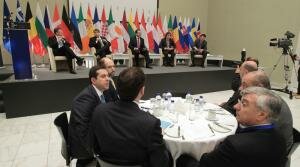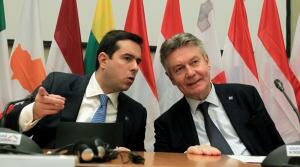- FACForeign Affairs (FAC)
Ensuring transparency in transatlantic transactions a top priority for the EU
On Thursday 27 and Friday 28 February 2014, the Foreign Affairs Council (Trade) met in Athens under the chairmanship of Notis Mitarachi, Deputy Minister for Development and Competitiveness of the Hellenic Republic. During the Council a constructive discussion of all key aspects of the EU foreign trade agenda took place.
On the first day, the Foreign Trade ministers discussed at a working dinner the EU’s strategy and coordination at the WTO, evaluated the Bali meeting of last December, focusing on the technical aspects for the successful implementation of its results, and, finally, outlined the EU’s tactics on the Doha Development Agenda items not covered at Bali.
The Council then opened up to business leaders from Europe and from across the Atlantic, who exchanged views on the expectations of both sides from the TTIP [the Transatlantic Trade and Investment Partnership agreement negotiated between the EU and the United States] at a panel discussion on 28 February. Both sides agreed that, despite their different approach on specifics, the TTIP will boost welfare and jobs in the EU, the USA and throughout the world; they also encouraged political leaderships to pursue an ambitious and far-reaching agreement.
In the morning session, the ministers discussed the state of play in the TTIP negotiations and the EU’s priorities. As the TTIP is considered an effective tool for growth, the ministers agreed that both sides should work hard in order to eliminate tariffs, coordinate their regulatory framework and abolish Non Tariff Barriers. The E.U.’s overall aim is to enable European companies to gain easier and cheaper access to the U.S. and promote transparency. As the President of the FAC (Trade), Deputy Minister Notis Mitarachi said : “Ensuring transparency in transatlantic transactions constitutes a top priority for the Greek Presidency of the Council and for the EU”.
The technical issue of trilogues and interinstitutional trilogues on pending foreign trade legislative initiatives was then addressed. The Greek Presidency informed that the first trilogue on the Trade Enforcement Regulation was successfully completed; the one on Financial Regulation is progressing despite the difficulties; and that work on both IPI (Intellectual Property) and TDI (Trade Defence) Initiatives must be intensified.
The Ministers then exchanged views on the current situation in Ukraine and the role of the EU in restoring stability in the country, bearing in mind that it was the non-signature of the Free Trade Agreement between the EU and Ukraine that triggered the current crisis.
The Ministers agreed that investment relations with Myanmar are on a new and promising path, with many opportunities and challenges ahead for both sides. A tight work schedule is expected to allow negotiations for an investment protection agreement to start by the time of Commissioner De Gucht’s visit in mid-March.
Finally, the Ministers agreed that negotiations on a EU-Mercosur Free Trade Agreement must go ahead with the exchange of offers on goods, services, establishment and public procurement as soon as possible.
The Informal FAC (Trade) Council concluded with a working lunch which focused on improving the international protection of Geographically Indicated (GI) EU agricultural products. The Greek Presidency considers increased protection of GIs to be of paramount importance in order for Europe to promote exports of its high quality agricultural products. The work of the European Commission in this field was praised. The Greek Presidency considers the protection of GIs both within the EU and in third countries a priority and reiterated its intention to promote policies that would enhance the competitiveness of European producers in world markets.










